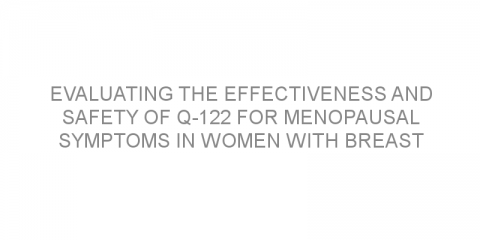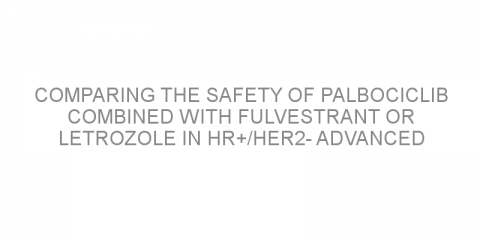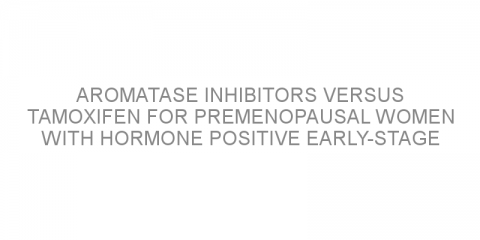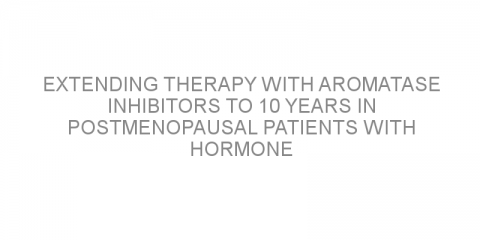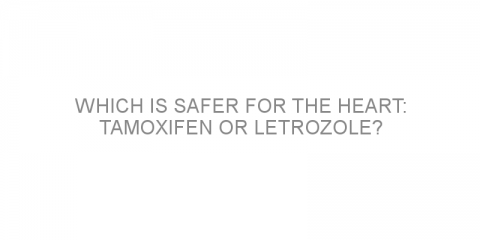In a nutshell The study evaluated the effectiveness and safety of Q-122, a new non-hormonal oral treatment for menopausal symptoms in women with breast cancer taking hormonal therapy. The study found that Q-122 is effective and safe in treating menopausal symptoms in these patients. Some background The treatment for hormone receptor-positive...
Read MoreHormone receptor status-Positive (ER and/or PR) Posts on Medivizor
Comparing the safety of palbociclib combined with fulvestrant or letrozole in HR+/HER2- advanced breast cancer
In a nutshell This study evaluated the safety profile of palbociclib (Ibrance) combined with either fulvestrant (Faslodex) or letrozole (Femara) in patients with hormone-receptor-positive (HR+) and HER2 negative (HER2 -) advanced breast cancer (BC). The data showed that both palbociclib regimens were safe and tolerated in these patients with some...
Read MoreAromatase inhibitors versus tamoxifen for premenopausal women with hormone positive early-stage breast cancer treated with ovarian suppression.
In a nutshell This study compared the effectiveness of aromatase inhibitors (AIs) versus tamoxifen (Nolvadex) for the treatment of premenopausal patients with estrogen receptor-positive (ER+) early-stage breast cancer (BC) treated with ovarian suppression. The data showed that AIs significantly reduced the risk of BC recurrence compared...
Read MoreExtending therapy with aromatase inhibitors to 10 years in postmenopausal patients with hormone receptor-positive early-stage breast cancer.
In a nutshell This study evaluated the effectiveness and safety outcomes of extending treatment with letrozole (Femara), an aromatase inhibitor, to 10 years in postmenopausal patients with hormone receptor-positive (HR+) early-stage breast cancer (BC). The data showed that extending treatment with letrozole to 10 years significantly improved the...
Read MoreReviewing common effects of hormonal therapy in patients with breast cancer.
In a nutshell This article reviewed the common side effects of estrogen deprivation during hormonal therapy for women with breast cancer and provided an update on alternative therapies to manage these symptoms. Some background Breast cancer (BC) is one of the most common cancers affecting women worldwide. Some BC cells grow in response to female...
Read MoreComparing the real-world effectiveness of palbociclib plus letrozole versus letrozole alone in patients with advanced hormone-positive breast cancer
In a nutshell This study compared the real-world safety and effectiveness of the palbociclib (Ibrance) plus letrozole (Femara) versus letrozole alone in patients with hormone receptor-positive (HR+)/human epidermal growth factor receptor-negative (HER2-) metastatic breast cancer (MBC). The data concluded that palbociclib in combination with...
Read MoreAdding S-1 to hormonal therapy in patients with ER+ HER2- breast cancer
In a nutshell This study investigated whether adding oral S-1 (Teysuno) to hormonal therapy improved outcomes in patients with estrogen receptor (ER)-positive and HER2-negative primary breast cancer (BC). The data showed that the combination of S-1 with hormonal therapy could be a potential treatment option for these patients. Some background...
Read MoreAlpelisib and fulvestrant treatment for PIK3CA mutated, hormone receptor-positive, HER2-negative advanced breast cancer
In a nutshell This study aimed to investigate the combination of alpelisib (Piqray) and fulvestrant (Faslodex) in patients with PIK3CA-mutated, hormone receptor-positive (HR+), human epidermal growth factor 2 (HER2) negative, advanced breast cancer (BC). This study concluded that this combination provided positive outcomes for...
Read MoreWhich is safer for the heart: tamoxifen or letrozole?
In a nutshell This study compared the safety of two hormonal medications used to treat breast cancer, tamoxifen (Nolvadex) and letrozole (Femara). This study found that tamoxifen was associated with an increased risk of blood clots, while letrozole was associated with an increased risk of angina and heart attacks. Some background Hormone-positive...
Read MoreTreating postmenopausal women with HER2- and hormone-receptor positive metastatic breast cancer with lapatinib, trastuzumab and aromatase inhibitor
In a nutshell The study evaluated outcomes of lapatinib (Tykerb), trastuzumab (Herceptin), and aromatase inhibitor (AI) in postmenopausal women with human epidermal growth factor receptor 2-positive (HER2+) and hormone receptor-positive (HR+) metastatic breast cancer (MBC). The authors found that the combination was safe and effective in such...
Read MoreSearching for patients with advanced breast cancer to trial an experimental drug combination
In a nutshell This phase 2 trial will investigate the safety of experimental treatment zanidatamab (ZW25) in combination with palbociclib (Ibrance) and fulvestrant (Faslodex) in patients with advanced breast cancer (BC). The main outcomes evaluated will be the rate of side effects and survival without cancer worsening. This trial is...
Read MoreAbemaciclib plus trastuzumab for advanced HER-2 positive breast cancer
In a nutshell This study looked at abemaciclib (Verzenio), trastuzumab (Herceptin), and fulvestrant (Faslodex) for the treatment of advanced hormone-receptor-positive (HR+) and HER2 positive (HER2+) breast cancer. It found that this treatment led to better outcomes than standard-of-care chemotherapy for these patients. Some background Worldwide,...
Read More
